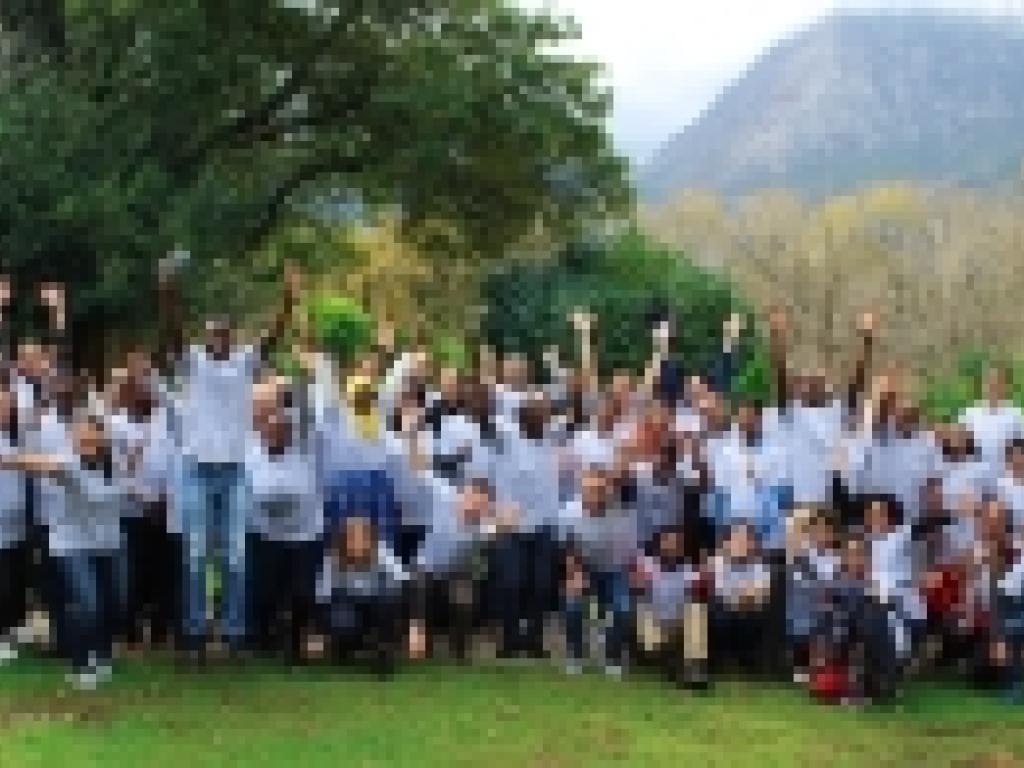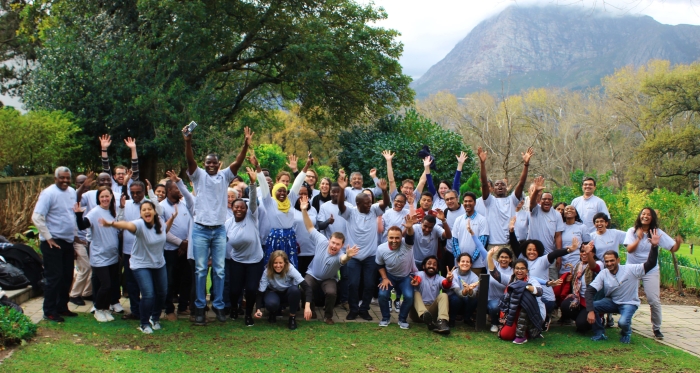Junior researchers, experts, vulnerable people, policy makers: Strengthening the capacities of all those touched by ASSAR

By Lucia Scodanibbio, ASSAR project coordinator
According to its logframe (yawn...) 20% of ASSAR’s success rests on the capacities it has built. After interacting with a range of ASSAR team members about what they learned or taught through the project, I can assure you that this is one of the most exciting and impactful results arising from ASSAR! You will get a glimpse of that through the testimonies that follow, but let me also give an overview about the range of ways in which ASSAR has sought to strengthen capacities.

ASSAR team members at the 2018 Annual Meeting
Capacity building through supporting students and early career researchers
A significant proportion of ASSAR’s research has been undertaken by Masters and PhD students, particularly in southern and west Africa and with the involvement of research assistants and post-docs in all regions. As Mary Thompson, research lead from START, says: “The intention of bringing these early career researchers on board has been to harness and leverage the work of ASSAR to strengthen and expand the growing scientific leadership base in semi-arid regions of Africa and Asia”.
Internal capacity building through training events, small grants, mentorship and collaborative research
Over its lifetime, ASSAR has funded and organised a range of formal workshops and writeshops on a range of topics (see box), which have benefitted early career and senior researchers alike. Aside from furthering knowledge on vulnerabilities, climate adaptation and responses, these activities have strengthened facilitation, curriculum development, workshop planning and scenario development skills of both researchers and practitioners.
In addition, given the wide-ranging expertise and experience represented across ASSAR, a specific fund was established to support professional development of early career researchers by strengthening individual research, science communication and networking capacities. Named the Small Opportunities Grant, this provided the chance for young scientists to tap into a broad spectrum of strengths, skills, perspectives, and ideas across different semi-arid hotspots. Focused on fostering knowledge and skills in relevant specialty areas, such opportunities often contributed toward joint outputs across the ASSAR regions. With the intention of furthering ASSAR’s impact, some of these grants were specifically aimed at bolstering the influencing and communications capacity of the ASSAR researchers, building stronger ties with stakeholders in the regions and boosting the RiU work currently being done by the regional teams.
Strengthening external capacities at many different levels
Through the numerous participatory processes that ASSAR has facilitated (such as Transformative Scenario Planning, Participatory Scenario Analysis, Vulnerability and Risk Assessments) we have strengthened adaptive capacities, fostered dialogue between stakeholders who generally do not interact, and encouraged inclusive adaptation planning by enhancing stakeholders’ understanding of the impact and consequences of climate change as well as potential responses. Some of our partners, like IIHS, also engage in formal training courses aimed at government officials or young leaders, to ensure that the latest ASSAR thinking influences current and future decision makers.
In addition, in 2017-18, START provided ASSAR partners with funding through the Grants for Local Adaptation Support (GLAS) and Scenario-Based Capacity Building (SBCB) awards. These grants were developed in recognition of the need to go beyond academic capacity building within ASSAR to do more to strengthen the capacities of those living and working in our study sites. The GLAS are intended to draw from findings of ongoing ASSAR research to support the most vulnerable groups in each region on overcoming barriers to and supporting enablers of their adaptation. The SBCB grants were developed to build on the momentum, insights and connections made through the regional scenario processes and to align with ongoing ASSAR research findings to attain actionable results.
As the project begins to wind down and we are able to look back upon our achievements, we feel more confident to assert that the capacity building activities that ASSAR has enabled constitute one of the most valuable and rewarding components of our work. From less formal interactions to the range of training activities mentioned above, we have created opportunities for young scientists to engage with experts they may not have otherwise had the chance to, we have connected regional research teams with stakeholders around real adaptation needs and solutions, and have built relationships within and outside of the project that are anticipated to last beyond its lifetime.
ASSAR capacity building in numbers
- Approximately 90 early career researchers trained through ASSAR
- Approximately 30 writeshops and training workshops on gender, migration, governance, land use and land cover change, climate science, Research-into-Use approaches and strategies (including Transformative Scenario Planning and experiential learning), influencing methods and tools, etc.
- 18 small opportunities grants for early career researchers to collaborate and learn from senior ASSAR members and each other
- Six grants to develop the capacities of vulnerable groups in the four ASSAR regions; multi-stakeholder processes on participatory, inclusive adaptation planning; targeted trainings to enhance stakeholders’ understanding of the impact and consequences of climate change, and potential responses
- Four grants to extend the work begun during the multi-stakeholder processes (TSP, PSA)
This article first appeared in the ASSAR Spotlight on Capacity Building (September 2018).